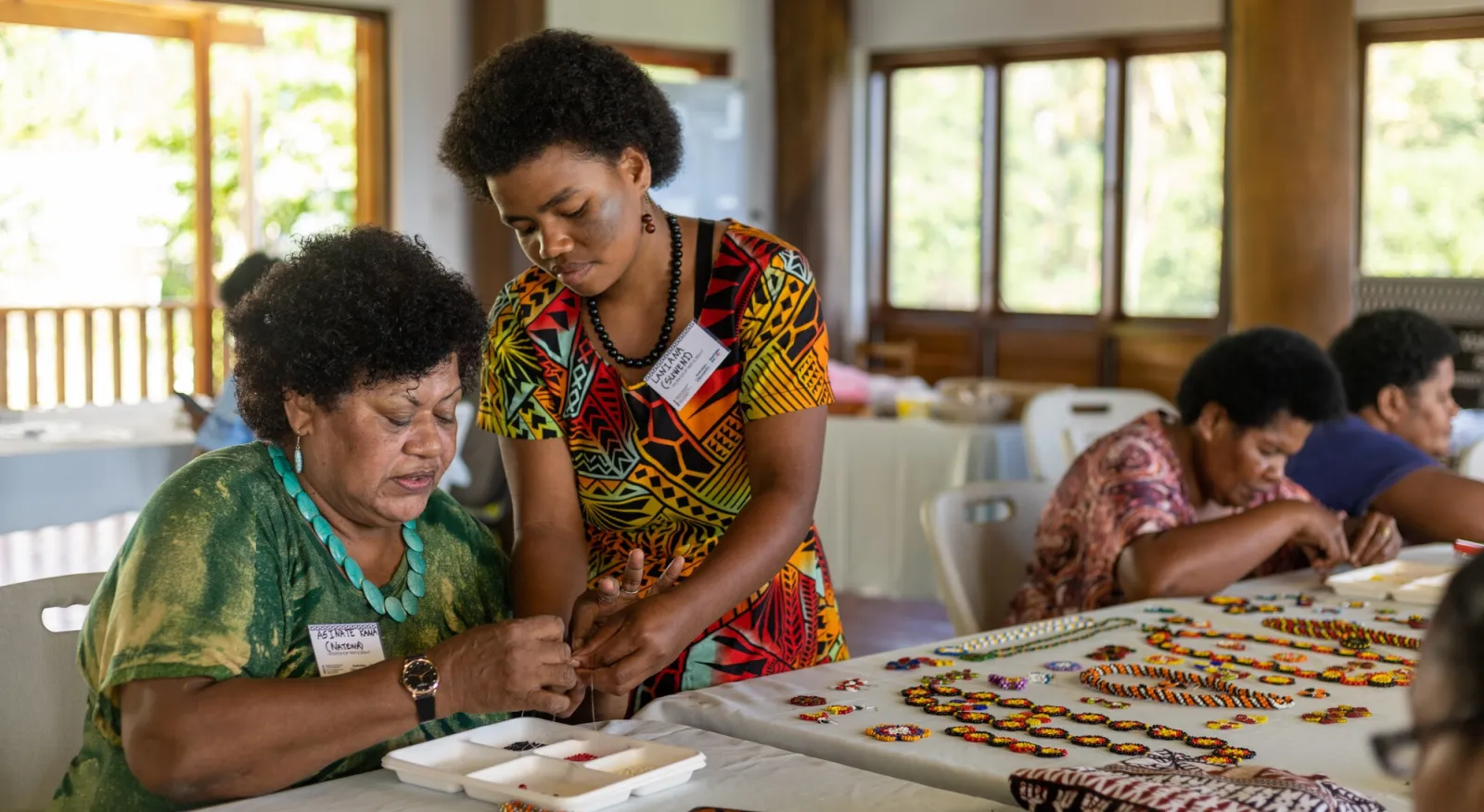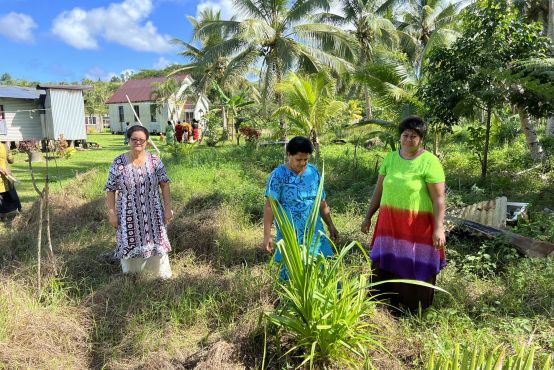
About Fiji
Fiji is one of the Melanesian countries, known for its warm and friendly culture.
Fiji is a parliamentary democracy, and home to around 900,000 people. Most live on the nation’s two main islands, Viti Levu and Vanua Levu, with the remainder distributed across about 110 of Fiji’s more than 300 islands.
The islands of Fiji were initially settled by the Lapita people in around 1500-500 BCE and over centuries developed into different cultural groups. European contact began in the 17th century, and in 1874 Fiji became a British Crown Colony. Indentured Indian labourers were brought to Fiji by the British colonial authorities, resulting in Fiji having a vibrant Fijian Indian community today.
Fiji became independent in 1970. It is a secular state, and its constitution stresses a common and equal citizenry and full equality regardless of race, religion or gender. Fiji has experienced periods of political instability, including coups in 1987, 2000, and 2006, which have influenced its political landscape. Fiji is an outward-looking nation that has contributed to international efforts to establish peace and security.
Fiji is the economic and technological hub of the South Pacific, and has one of the region’s most developed economies. Industries in Fiji include tourism, sugar, natural resources, timber, fish and fish products, manufactured goods and agricultural produce. Fiji is also the hub for international development in the Pacific and facilitates development assistance throughout the region.
Australian volunteers have supported a wide range of Fijian partner organisations to achieve their development goals since 1967.
Learn more about the Australian Volunteer Program's work in Fiji.
Key things to consider about volunteering in Fiji
- Cyclone season in Fiji is from November to April, and they can be mild or cause major destruction. Volunteers must be prepared and follow instructions from in-country staff and authorities to ensure their safety.
- Fiji lacks good quality road infrastructure, making driving conditions at times dangerous or difficult to get around. There are frequent power outages and internet issues due to infrastructure and weather conditions.
- Religion is an important part of Fijian culture and heritage. Volunteers are often invited to a Fijian church service by friends or colleagues. Accepting these invitations can help develop relationships and deepen understanding of Fijian society.
- There are no official public transport timetables. Timetables and routes may not exist for local buses and bus stops. It is important to familiarise yourself with local surroundings and bus routes to understand of how public transport operates in area.
- "Fiji time" is real – the slow pace of life means things can sometimes take longer than they might in other places. Be patient and respectful and embrace the slower pace of life.
Partner spotlight
Find out from our partners at Soqosoqo Vakamarama i Taukei ni Cakaudrove how an Impact Fund grant helped strengthen the capacity of rural Fijian women by strengthening traditional knowledge.

Culture and religion
Today the most visible differences in society in Fiji are between the two main islands - Viti Levu and Vanua Levu - and the rest of the country. Viti and Vanua are the biggest islands, and their cities can look more Western than the smaller, more rural islands.
When living in Fiji, volunteers are invited to learn about the rich cultures and history that make up Fiji. The diverse population of indigenous Fijian, Indian, European and Chinese heritage is all part of daily life, music, food, festivals and art. Music and song are a big part of everyday life in Fiji.
Religion
Religion is an important part of Fijian culture and heritage, and the multi-cultural nature of the population means a wide range of religions are followed. Christian churches, mosques, and Hindu and Sikh temples are all present and act as community hubs.
Volunteers are welcome at Fijian church services to deepen their understanding of Fijian society.
Dress
Dress codes vary depending on where you are in Fiji. Outside major cities dress codes can often be more conservative. It is customary to cover shoulders and knees and to avoid revealing clothing. The traditional Fijian sulu (sarong) is widely worn. Fijians often wear brightly coloured clothing, and often appreciate when visitors do to.
Language
English is well spoken throughout Fiji and taught in schools from an early age. ITaukei (indigenous language) and Hindi are also official languages and typically the first language among indigenous Fijian and Fiji Indian cultures respectively.
Learning a few words of Fijian before you arrive, and how to pronounce the main place names correctly will earn volunteers a few extra smiles. 'Ni sa bula' or simply 'bula' is the universal Fijian greeting, and 'vinaka' is ‘thank you’ or ‘good’.
The program provides funding to support language lessons. More information on this process will be available during the onboarding process.
Explore our Pride Guides
LGBTQIA+ program participants must be aware of the country's context before undertaking an assignment. Pride Guides are designed to introduce key issues related to people with diverse SOGISEC and their participation in the program.
Learn more
Day to day life
Climate
Year-round maximum temperatures in Fiji tend to be between 26°C and 31°C and much of Fiji is characterised by wet and dry zones. As a tropical island, the wet season is a vital part of Fiji's climate and is responsible for the lush environment and plant life that is so plentiful. Cyclones occur in Fiji but are normally confined to the wet season.
It is important to note the effects of climate change on day-to-day life and weather patterns in Fiji. According to the World Bank, 'Fiji has a high degree of vulnerability to climate extremes such as drought and extreme rainfall. Considerable uncertainty surrounds projections of future precipitation trends and extreme climate events'.
Telecommunications
Fiji has similar telecommunication standards to Australia. Volunteers can purchase a mobile handset, mobile package, and Wi-Fi on arrival.
Food and dining
Grocery shopping in Fiji usually means visiting more than one or two places. Seasonal fresh fruit and produce can be found in markets, and products with a long shelf-life at grocery stores.
Being a vegetarian or gluten-free in Fiji is relatively easy thanks to the plethora of Indian food. Major restaurants usually have a vegetarian option, though finding vegan meals can be a challenge.
Food shopping on the outer islands requires time and planning, as goods come from the larger islands.
Accommodation
Accommodation will vary from rural islands to the main islands. Volunteers can find a diverse range of accommodation types in Fiji, from freestanding houses and villas to apartment blocks. It is common for housing to come furnished or semi-furnished.
Find out about our in-country allowances.
Transport
Public buses are the main mode of transport on the two main islands of Viti Levu and Vanua Levu. Fiji has two main airports for domestic and international flights, as well as ferries and boat taxis connecting the outer islands.
Driving around Fiji is safe with the maximum speed limit set at 80 kilometres per hour. Volunteers are expected to drive by local rules and to be careful with animal crossings and unsealed roads.
Personal safety
When it comes to your safety and security you must be willing to adapt your behaviour and lifestyle to minimise the potential for being a target of crime. Like anywhere in the world, crime does exist in Fiji.
While Fiji is relatively safe, the most common forms of crime are opportunistic, such as robbery and petty theft.
Home break-ins are common, and many residents employ a security guard or live somewhere with a high fence. Volunteers will be supported to consider residential security features when choosing a place to live.
Personal safety issues constantly evolve, and we recommend you keep an eye on Smart Traveller for current information.
Mobility and accessibility
We’re committed to ensuring that international volunteering is inclusive and accessible to Australians from a range of backgrounds, with diverse perspectives, identities and abilities.
To support this, Access and Inclusion Plans are available for volunteers with disabilities to assess their needs and ensure their living and working requirements are fully considered. Indigenous Pathways is an Indigenous-led program that focuses on providing culturally safe, flexible and tailored support for Aboriginal and Torres Strait Islander volunteers.
Physical access for wheelchairs and other mobility aids are still emerging in Fiji. There is a growing number of accommodation options and facilities which provide access for the disabled and elderly. What some accessible infrastructure may be lacking, staff and locals more than make up for with their welcoming and inclusive nature and their muscle power, always at the ready to assist.
Before applying for a volunteering assignment in Fiji, please do some further research on living in Fiji and the organisation you are hoping to volunteer with. Successful applicants will have the opportunity to discuss expected living and working arrangements with their recruitment officer.